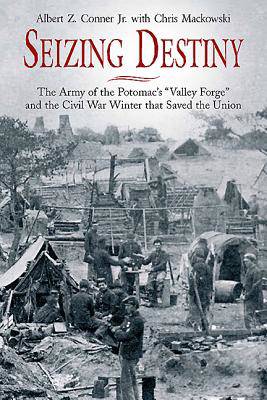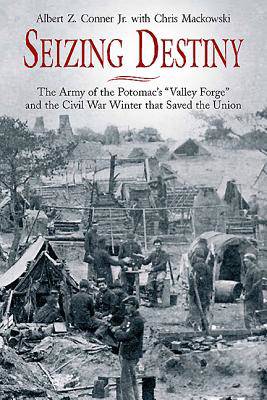
- Retrait gratuit dans votre magasin Club
- 7.000.000 titres dans notre catalogue
- Payer en toute sécurité
- Toujours un magasin près de chez vous
- Retrait gratuit dans votre magasin Club
- 7.000.0000 titres dans notre catalogue
- Payer en toute sécurité
- Toujours un magasin près de chez vous
Seizing Destiny
The Army of the Potomac's Valley Forge and the Civil War Winter That Saved the Union
Albert Z Conner, Chris Mackowski
Livre relié | Anglais
32,45 €
+ 64 points
Description
FINALIST, 2017, RICHARD HARWELL AWARD, GIVEN BY THE CIVIL WAR ROUND TABLE OF ATLANTA
"Depression. Desertion. Disease. The Army of the Potomac faced a trio of unrelenting enemies during the winter of 1863. Following the catastrophic defeat at the battle of Fredericksburg in December of 1862, the army settled into winter quarters--and despair settled into the army. Morale sank to its lowest level of the war while desertions reached an all-time high. Illness packed the hospitals. Political intrigues, careerist schemes, and harsh winter weather demoralized everyone. Even the army's livestock suffered, with more than 1,000 horses and mules dying every week.
Major General Joseph Hooker, a pugnacious tactician aptly nicknamed "Fighting Joe," took command of the army. And then a remarkable thing happened: a man known for his hardscrabble battlefield tenacity showed an amazing brilliance for organization and leadership. With Chief of Staff Dan Butterfield working alongside him, Hooker literally rebuilt the army from the bottom up. In addition to instituting vital logistical, ordnance, and administrative reforms, he insisted on proper troop care and rigorous inspections and battle drills. Hooker doled out promotions and furloughs by merit, conducted large-scale raids, streamlined the army's command and control, and fielded a new cavalry corps and military intelligence organization.
Hooker's war on poor discipline and harsh conditions revitalized a dying army and instilled individual and unit pride. During this 93-day resurgence, the Army of the Potomac reversed its fortunes and set itself on the path to ultimate victory. No other American citizen-army at war has engineered a more complete turnaround in the field. Hooker's achievement represents nothing less than the greatest non-battle turning point since Valley Forge in the American Revolution--a linkage recognized by hundreds of contemporary soldiers and civilian participants. Modern historians, however, have either failed to notice or have made only a passing reference to that link.
Seizing Destiny: The Army of the Potomac's "Valley Forge" is the first in-depth examination of one of the war's true crucial turning points, a time when the army nearly dissolved from its own despair even as the nation depended on that body of bayonets to defend the promises implied by the Emancipation Proclamation. Authors Albert Conner and Chris Mackowski ground their research in hundreds of primary sources and let the soldiers speak, from the lowest private to the highest general. The result is a rich and satisfying portrait of an overlooked success story that made Appomattox Court House in 1865 possible.
Here, finally, is the full story of how the citizen-soldiers of the Army of the Potomac overcame adversity, seized their destiny, and saved the nation through leadership, perseverance, patriotism, and faith."
"Depression. Desertion. Disease. The Army of the Potomac faced a trio of unrelenting enemies during the winter of 1863. Following the catastrophic defeat at the battle of Fredericksburg in December of 1862, the army settled into winter quarters--and despair settled into the army. Morale sank to its lowest level of the war while desertions reached an all-time high. Illness packed the hospitals. Political intrigues, careerist schemes, and harsh winter weather demoralized everyone. Even the army's livestock suffered, with more than 1,000 horses and mules dying every week.
Major General Joseph Hooker, a pugnacious tactician aptly nicknamed "Fighting Joe," took command of the army. And then a remarkable thing happened: a man known for his hardscrabble battlefield tenacity showed an amazing brilliance for organization and leadership. With Chief of Staff Dan Butterfield working alongside him, Hooker literally rebuilt the army from the bottom up. In addition to instituting vital logistical, ordnance, and administrative reforms, he insisted on proper troop care and rigorous inspections and battle drills. Hooker doled out promotions and furloughs by merit, conducted large-scale raids, streamlined the army's command and control, and fielded a new cavalry corps and military intelligence organization.
Hooker's war on poor discipline and harsh conditions revitalized a dying army and instilled individual and unit pride. During this 93-day resurgence, the Army of the Potomac reversed its fortunes and set itself on the path to ultimate victory. No other American citizen-army at war has engineered a more complete turnaround in the field. Hooker's achievement represents nothing less than the greatest non-battle turning point since Valley Forge in the American Revolution--a linkage recognized by hundreds of contemporary soldiers and civilian participants. Modern historians, however, have either failed to notice or have made only a passing reference to that link.
Seizing Destiny: The Army of the Potomac's "Valley Forge" is the first in-depth examination of one of the war's true crucial turning points, a time when the army nearly dissolved from its own despair even as the nation depended on that body of bayonets to defend the promises implied by the Emancipation Proclamation. Authors Albert Conner and Chris Mackowski ground their research in hundreds of primary sources and let the soldiers speak, from the lowest private to the highest general. The result is a rich and satisfying portrait of an overlooked success story that made Appomattox Court House in 1865 possible.
Here, finally, is the full story of how the citizen-soldiers of the Army of the Potomac overcame adversity, seized their destiny, and saved the nation through leadership, perseverance, patriotism, and faith."
Spécifications
Parties prenantes
- Auteur(s) :
- Editeur:
Contenu
- Nombre de pages :
- 384
- Langue:
- Anglais
Caractéristiques
- EAN:
- 9781611211566
- Date de parution :
- 16-01-16
- Format:
- Livre relié
- Format numérique:
- Genaaid
- Dimensions :
- 152 mm x 229 mm
- Poids :
- 907 g

Les avis
Nous publions uniquement les avis qui respectent les conditions requises. Consultez nos conditions pour les avis.






